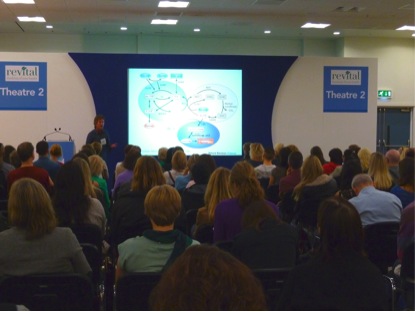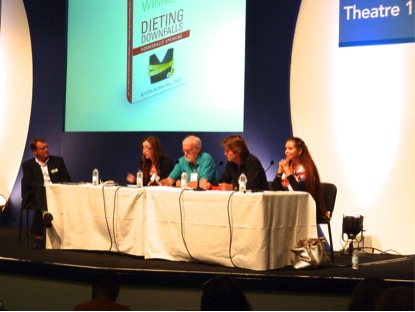Last weekend saw the newly rebranded UK camexpo hold its 12th dedicated tradeshow for integrative health and wellness professionals. In its new home in Kensington Olympia, London, over 4000 practitioners from multiple disciplines made full use of the wealth of knowledge imparted via the presentations, workshop seminars and from the exhibition floor. Camexpo provides us an annual opportunity to engage directly with practitioners and focus acutely on the challenges and issues they face working in the field of natural health in Europe. Between visitors to our stand, Robert Verkerk PhD’s presentation and contribution to the Obesity Panel, various meetings and the packed exhibition hall, it was an extremely busy, but fulfilling, couple of days for the entire ANH team.

ANH-Intl stand at CAM Expo 2014
It isn’t just Popeye who needs spinach
Executive and scientific director Dr Rob Verkerk’s presentation, “Balancing Methylation and Folate Trafficking — for healthful long lives”, was well attended and well received by practitioners. Intracellular folate and related pathways are a particularly fast-moving research area currently, as well as being, “…one of the most well researched epigenetic influences affecting our lifelong health and risk of disease.” In his presentation, Dr Verkerk addressed how to best manipulate folate, other B vitamins, cofactors and minerals to optimise DNA methylation, repair and gene transcriptionin the clinic. Slides are available on request for practitioners.

Robert Verkerk PhD presenting on methylation and folate trafficking
Don’t mention the ‘F’ word
Sunday’s Obesity Panel Debate brought together endocrinologist, Alyssa Burns-Hill PhD, Tam Fry, spokesperson for the National Obesity Forum, Jayney Goddard, President of The Complementary Medical Association and Rob Verkerk PhD to address potential integrated medicine solutions for the UK’s burgeoning crisis and waistlines.

From left to right: Carsten Holmes (chairperson, Diversified Communications), Alyssa Burns-Hill PhD, Tam Fry, Robert Verkerk PhD, Jayney Goddard
Rob Verkerk’s individual presentation contained 12 key points, which both summarise the issues at the heart of the obesity crisis, and act as a roadmap for those wishing to tread a different and leaner path.
- Genomics and epigenetics — understanding how an individual’s gene expression works with the environment and how a lot of those characteristics can be inherited. This includes single nucleotide polymorphisms (genetic variations) and the NHS’s apparent disinterest in performing the tests that look for them.
- Calorie madness — contrary to some people’s belief, 100 kcal of white bread, broccoli and grape seeds are not equal and do not have the same physiological effect on the body.
- Starchy carbohydrate reliance — more mainstream understanding that it’s carbs, and not fat, that are at the heart of the obesity epidemic would make an enormous difference to our over-reliance on these as a primary form of sustenance. Both the UK’s Eatwell plate and the US’ My Plate are carb heavy and place too much emphasis on grains.
- Wheat as staple — 1% are diagnosed intolerant to our major staple, wheat, which contains gluten. Gluten plays a role in leaky gut syndrome and gut dysbiosis, but as many as 1 in 5 have gluten sensitivity and intolerance.
- Food simplification — due to the globalisation of the food industry, there’s been a loss in the diversity of nature’s treasure trove that we used to eat. Indigenous and seasonal foods have largely been replaced with year-round availability of fruit and vegetables resulting in consumption of a far narrower range of phytonutrients.
- Food processing — ultra processing causes the loss of many nutrients, whilst denaturing essential proteins and fats, leading to the consumption of carb loaded empty calories.
- Fibre quantity and quality — this has reduced dramatically over the last 30/40 years in line with the rise in digestive disorders and colorectal cancers.
- Food combinations — our plate often consists of excess starchy carbohydrates, sugars, damaged proteins, anti nutrients (eg. gluten and lectins), and insufficient vegetables.
- Excess sweet fruits and fruit juices — sugar begets sugar! The more we eat, the greater our desire for sugar to keep stimulating the opioid receptors in our brain. Government advice says it doesn’t matter what form we get our fruits in, but juices are really just unopposed sugar in a liquid form.
- Synthetic sweeteners — consumption of sweeteners is creating many of the same issues as sugar. Stimulation of the nucleus accumbens or reward centre, in the brain sets off similar reactions as sugar, but now researchers have proven that there is also a detrimental effect on the gut microbiota.
- Meal frequency — the snacking culture vs calorie restriction vs activity in fasted state. Allowing your body to fast for at least 5 hours in between meals allows your gut to rest, your digestive enzymes to replenish, reduces inflammation and promotes fat-burning for energy. Exercising in a fasted state is potentiates all these beneficial effects, as well as switching off pathways that lead to chronic disease and cancer.
- Sedentary lifestyles — as humans, we’re programmed for activity and are therefore designed to be active for several hours a day. It has to be a priority to build in appropriate forms of regular physical activity to each and every day – as important as eating and sleeping!
Camexpo 2015 will be held a week earlier than usual on 26-27th September. You know where we’ll be if you find yourself in London that weekend!








Comments
your voice counts
There are currently no comments on this post.
Your voice counts
We welcome your comments and are very interested in your point of view, but we ask that you keep them relevant to the article, that they be civil and without commercial links. All comments are moderated prior to being published. We reserve the right to edit or not publish comments that we consider abusive or offensive.
There is extra content here from a third party provider. You will be unable to see this content unless you agree to allow Content Cookies. Cookie Preferences